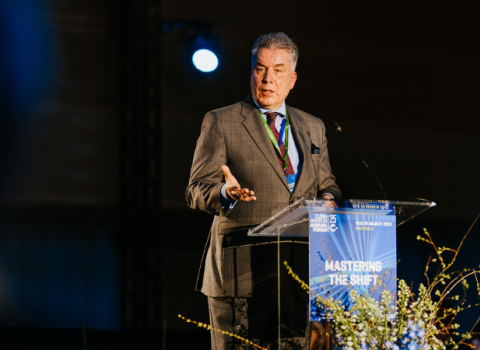With increasing air traffic and pressure on the quality of life, there is a growing need for quiet aircraft. That is why the UT, together with Brazilian aircraft manufacturer Embraer, the Netherlands Aerospace Centre (NLR) and the German-Dutch Wind Tunnels Foundation, has set up a consortium that works on the design and development of even quieter aircraft.
With the development of turbofan engines, new aircraft have already become much quieter in recent years. The greatest gains can now be made in reducing fuselage noise caused by the airflow along the wings, the attached flaps and the landing gear, among other things. The challenge for aircraft designers is to develop quieter alternatives that deliver the same or better performance and are at least as safe and cost-effective.
During development, it is important to be able to properly test the noise output of new quiet concept aircraft during the design process. Due to the tremendous economic interest, it is essential that the wind tunnel tests of scale models for these aircraft correspond as closely as possible to the performance of actual aircraft under real flight conditions. The partners in the newly established consortium will pool their expertise and resources in order to bring the results of the tests as closely in line with real-life scenarios as possible.
Two PhD students from the Engineering Fluid Dynamics (EFD) department at UT are working on the project, making intensive use of the department's recently renovated aeroacoustic wind tunnel. It is equipped with the most advanced flow measurement techniques and noise source localisation methods.
Project silent approach
Researchers from the Department of Engineering Technology are working closely with Brazilian partners in the aviation industry. For example, there is an exchange programme with the Brazilian aviation institute, ITA, and students from UT and ITA can participate in a double degree master's programme that allows them to earn degrees from both schools. Recently, a delegation from UT visited Brazil, led by Vice Chancellor Thom Palstra and dean of the Department of Engineering Technology, Geert Dewulf. They explored the possibilities for further strengthening relations and joint projects with industrial and academic partners. Project Silent Approach, by university lecturer Leandro de Santana and Kees Venner (chairman) of the EFD group, is the first major milestone in these developments. Daniel Moczydlower (Vice President of Technological Development at Embraer): "Silent Approach is a good example of both the university and industry contributing to faster technological progress. This yields benefits for society as a whole."
This release was first published 31 August 2018 by the University of Twente. https://www.utwente.nl/en/news/!/2018/8/86244/ut-joins-forces-with-industry-to-build-quieter-aircraft





 A unique international forum for public research organisations and companies to connect their external engagement with strategic interests around their R&D system.
A unique international forum for public research organisations and companies to connect their external engagement with strategic interests around their R&D system.